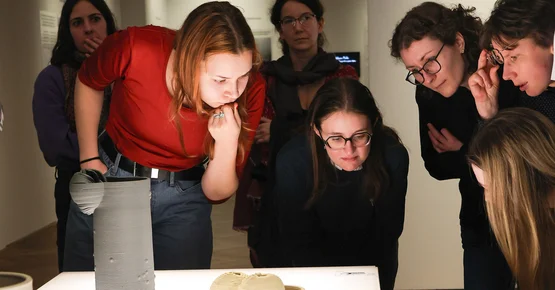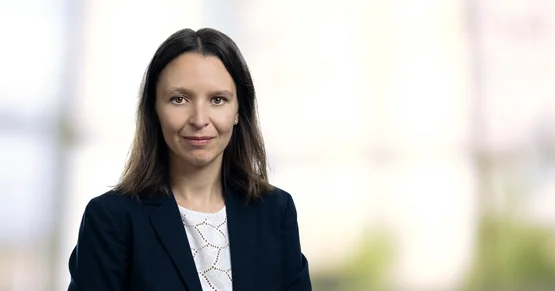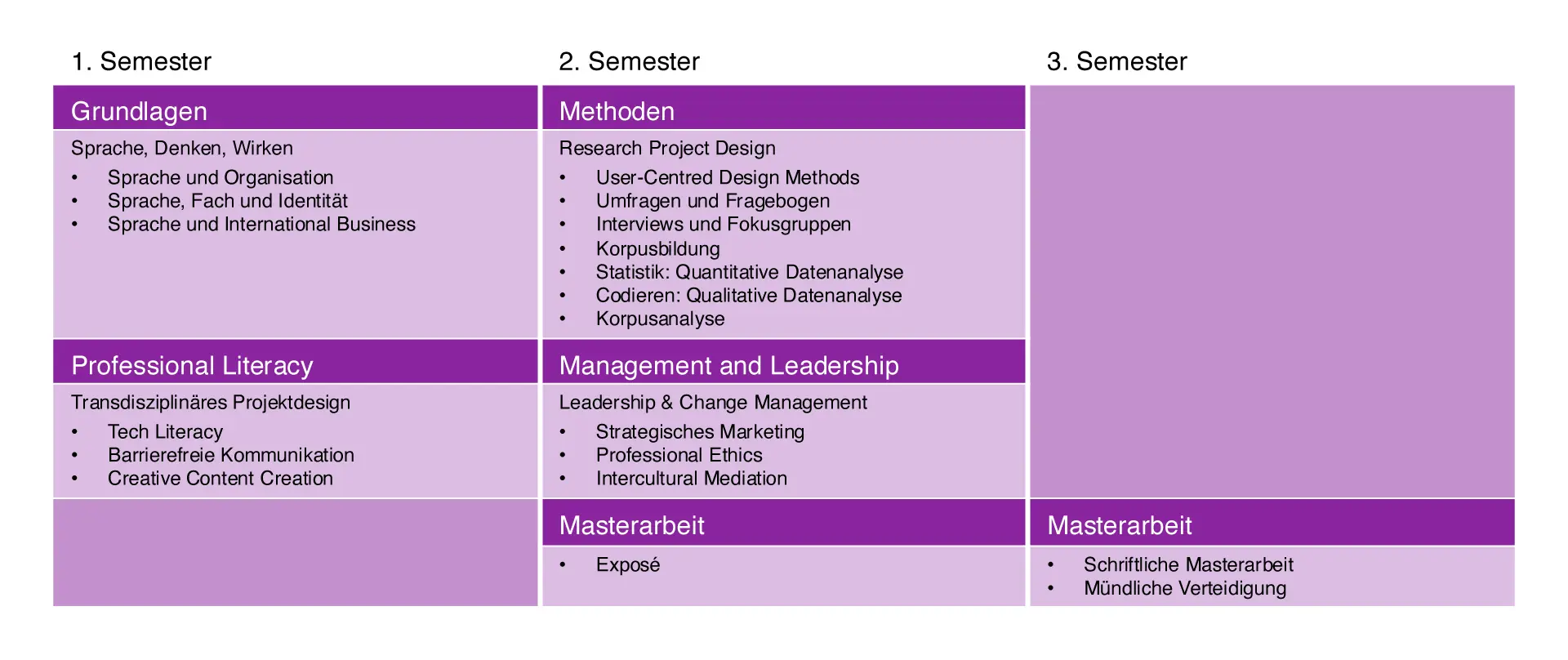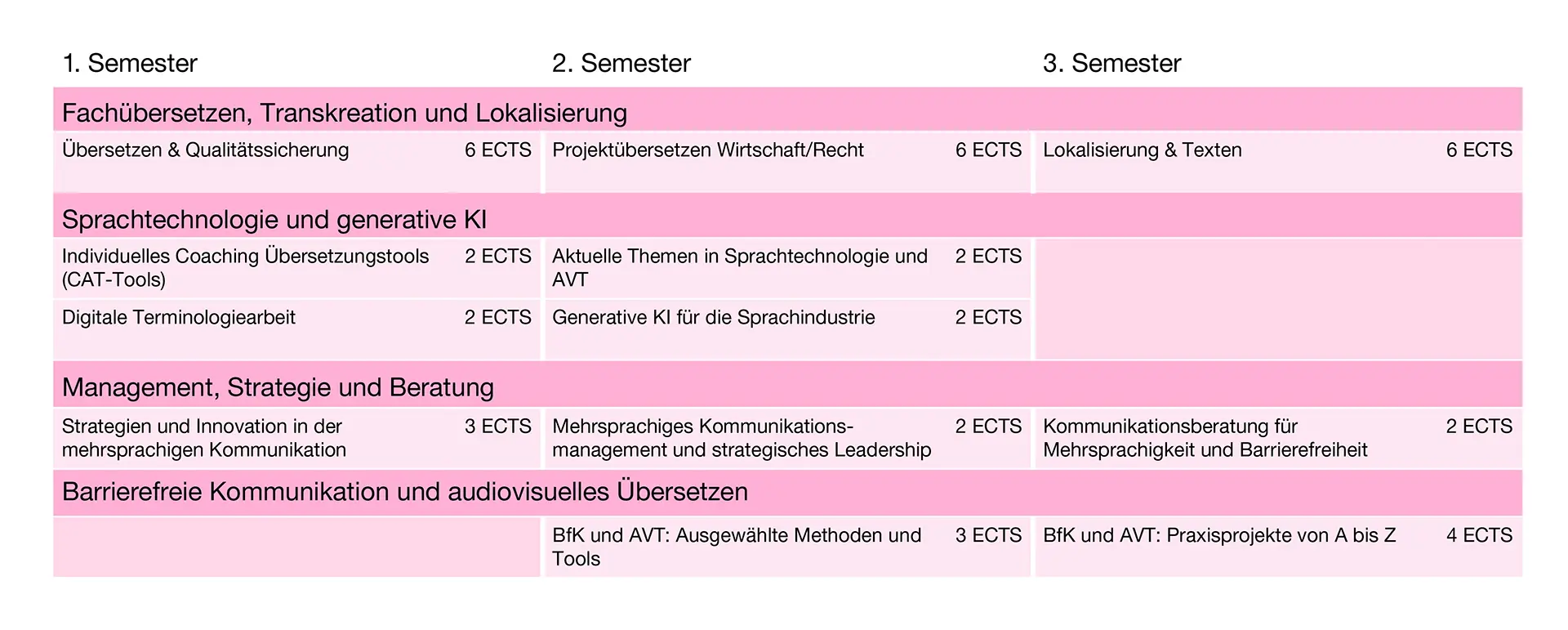Specialisation in Multilingual Communication Management
In the specialisation in Multilingual Communication Management, you are provided with the tools you need to handle demanding tasks in the language service industry. You are able to use artificial intelligence in the field of language mediation and acquire the skills that allow you to demonstrate where humans are superior to DeepL and similar tools in performing your daily work.
During the MA programme, you combine profound knowledge of language mediation with skills that make up the repertoire of a translator of texts from the fields of business, law, technology and the natural sciences. In the process, you learn to capitalise on the use of the latest digital tools in the areas of terminology and translation technology.
As part of realistic projects, you familiarise yourself with complex issues from the world of specialised translation. In parallel, you expand your skill set in the areas of revision and quality assurance as well as in connection with machine translation, pre-editing and post-editing.
In modules related to translation management, you prepare yourself to take on management roles in the language industry. You become adept with the techniques of translation consulting and learn how to use them before subsequently looking at practices and processes within the language industry.
You also familiarise yourself with important techniques in the areas of accessible communication and audiovisual translation, including audio description, respeaking, easy-to-read language and subtitling. You practice these techniques in real university projects in collaboration with partners from the world of practice.
In your Master’s thesis, you tackle a problem encountered in multilingual communication management that you believe is worth solving in order to pave the way for your future career.
Insights into the degree programme
-

«Übersetzen in Leichte Sprache ist gar nicht so leicht»
Studierende der Mastervertiefung Multilingual Communication Management (bisher: Fachübersetzen) haben für eine Kunstausstellung im Gewerbemuseum Winterthur Texte in Leichte Sprache übersetzt. Was die ...
-

Übersetzer:innen haben Zukunft – nicht nur in der Bundesverwaltung
Generative KI und maschinelle Übersetzung fordern Sprachexpert:innen heraus. In der Bundesverwaltung ist das nicht anders. Eléonore Feuz, Leiterin der Sprachdienste des Eidgenössischen ...
-

Interaktives Post-Editing unterstützt Kreativitätsgefühl beim Übersetzen
Michael Wetzel und Gabriele Gelormino haben in ihrer Masterarbeit untersucht, welchen Einfluss die Art des Post-Editings auf die Kreativität von Fachübersetzer:innen hat – mit spannenden Ergebnissen ...
Career opportunities
Professional translators work as freelancers or are employed as in-house translators. Their clients or employers may be companies in the private sector, government authorities and public services, national and international organisations, trade unions or professional associations. Your professional success as a translator will depend on factors such as your language combination, the economic situation, your area of specialisation, level of professionalism, flexibility and own initiative. Fluctuating demand may mean that working hours and contracts vary greatly.
Qualified translators also have good career opportunities in various areas of the language service industry (for example revision, editing, terminology, project management, accessible communication or audiovisual translation).
A Master's degree in Language and Communication with a specialisation in Multilingual Communication Management gives you the opportunity to enter these professions directly.
Key information

The research-based core modules form part of the Master’s degree for all specialisations. In the core modules, you learn to reflect critically and constructively on professional practice. The modules investigate principles and methods of applied linguistics. In plenary lectures and in small groups of students from the various specialisations, you consider central issues relating to applied linguistics in professional practice and learn how to assess communication output in a proficient manner.
You can find all information specific to the specialisation in Multilingual Communication Management on this website. All important information about the core modules and other specialisations within the MA programme can be found on the MA in Language and Communication page.
In the programme, you take two or three languages of study: your native or dominant language (A language) and either an active foreign language (B language) or two passive second languages (C languages). You translate out of your B and C languages into your A language and out of your A language into your B language. You therefore take two language versions with either AB or ACC as your language combination. One of the languages you pursue must be German.
The results you achieve in the professional aptitude test will determine which of your languages is classified as A, B and/or C.
The table below gives you an overview of the languages and language combinations we currently cover in the specialisation in Multilingual Communication Management. The MA programme director reserves the right to cancel a language version if there are not enough students enrolled.
| A language | B or C languages | C language only |
|---|---|---|
| German | French, English, Italian, Spanish | Chinese, Russian |
| French | German, English, Italian | |
| Italian | German, English, French | |
| English | German, French, Italian, Spanish | |
| Spanish | German, English |
Specialisation modules (from spring semester 2026)
Part-time study
You can choose to complete the MA in Language and Communication on either a full-time or part-time basis. The full-time programme is designed to be completed over three semesters. A part-time programme lasts between four and six semesters and can be applied for in writing via the academic office both prior to the commencement of the MA programme and during your studies (subject to certain conditions).
Admission
Successful candidates have:
- strong written communication skills in diverse contexts, a quick understanding and good powers of concentration; they are creative in their approach to problem-solving, intellectually curious and are able to deal with criticism and to cope with pressure;
- a good general education as well as a thorough knowledge of economic, social, political and cultural conditions in the cultural areas of their chosen languages;
- an outstanding command of their native language and at least one foreign language.
Before you begin your studies, we recommend you do an internship in translation or the language service industry, preferably abroad in a country where one of your foreign languages is spoken. This will give you the chance to gain useful professional experience and to establish contacts, while improving your language skills and enhancing your cultural knowledge.
Prior to starting your studies, you have the opportunity to complete an online bridging course. This self-study course allows you to prepare for the Master’s degree programme with selected reading material and translation exercises. You will be provided with further information after submitting your application.
You must fulfil the following formal conditions in order to be admitted to the programme:
- Bachelor’s degree
You must hold a recognised Bachelor’s degree or an equivalent tertiary level qualification. - Professional aptitude test
The written professional aptitude test for the specialisation in Multilingual Communication Management is designed to assess your practical skills. In the test, you translate a general language text from your chosen foreign languages (B and/or C languages) into your native language (A language) and, if applicable, from your native language (A language) into one active foreign language (B language). To be admitted to the programme, you must achieve the language combinations ACC or AB. You may register for a maximum of two B languages and four C languages for the professional aptitude test.
Information sheet on the professional aptitude test (in German) - Language competence (English/German)
To be admitted to the programme, you must have English language competence of at least C1 level and, in the case of non-native speakers of German, German language competence of at least C2 level. You will have to provide evidence in the form of language certificates, study records or job references. If you are unable to provide evidence of this kind, you will be required to take a written language test at the ZHAW.
Please note that individuals who have been excluded from a Master’s degree programme at other universities that covers equivalent content can no longer be admitted to the corresponding specialisation at the ZHAW.
Dates and deadlines
Applying in good time will allow you to optimally plan and prepare for your studies. On request, applications submitted at a later date may be considered. Please contact the degree programme office in this regard directly by sending an e-mail to master.linguistik@zhaw.ch.
| Programme start: Spring semester 2025 | |
|---|---|
| Deadline for applications 1 | 15 May 2025 |
| Professional aptitude test 1 | 23 June – 4 July 2025 |
| Language test 1 | 5 September 2025 |
| Deadline for applications 2 | 30 September 2025 |
| Professional aptitude test 2 | 27 October – 7 November 2025 |
| Language test 2 | 1 November 2024 |

